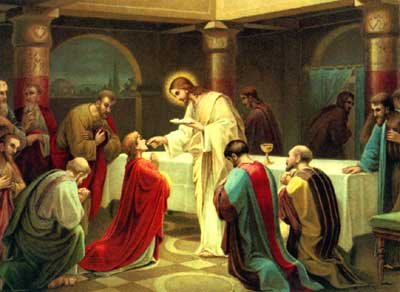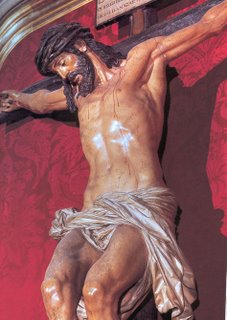First Holy Communion

The 3rd Sunday of Easter
Today’s Readings: Acts 3:13–19; Ps. 4; 1 Jn 2:1–5; Lk 24:35–48 [Link to Readings]
For a long time after I moved out of New York, people would ask me if I missed living in the city. Actually, there was really just one thing that I missed terribly—and that was the bakeries. The fresh-baked bread there is the best!—hot, crusty rye bread… fresh, soft bagels and bialies… wonderful pizza… luscious donuts… and so much more.
That’s why I can really relate to the opening line of today’s gospel—that Jesus was made known to the disciples in the breaking of bread. There’s no doubt that Jesus was the best bread. When we heard the gospel about the wedding feast of Cana, St. John made a point to say that Jesus turned the water into the best wine. For our Lord, only the very best!
Today, in our parish, we are privileged to celebrate First Holy Communion. Another wonderful group of youngsters from St. John’s will approach the altar for the very first time to receive not the world’s best bread, but the Bread of Angels… the Bread that came down from Heaven.
It’s a wonderful thing that Our Lord decided to make himself present in the form of bread. After all, he could have come to us in any form he chose. But why bread?
For one thing, because bread is perhaps the most universal food in the world. And remember, God’s plan is to include everyone in his church. That’s what the word “catholic” means.
And even though bread is available everywhere, it’s not a fancy or expensive food. We don’t eat the caviar of God… or the lobster of the Lord… or the Italian truffles of God at $2,500 a pound. Just about everyone can have a little bread, even if it’s only a crust.
But while bread is a “poor man’s meal,” it can also be the most satisfying food in the world. There is nothing like the aroma and flavor of freshly-baked bread to delight the senses…
These are the reasons why Our Lord chose bread to be his eucharistic form. What rich symbolism in an everyday object so simple, so available, so ordinary, yet so satisfying to all of God’s children.
When was the last time you had bread? For most people, it was today! Or at the least, yesterday. Maybe you had a piece of toast this morning… or a sandwich… or a donut… or a slice of pizza. If we don’t nourish ourselves with bread, on a regular basis, we shrivel up and die. That’s what happens when you don’t take nutrition into your body.
Interestingly, Jesus says the same thing about himself, the Bread of Life. Unless you receive him into your life and into your heart, you’ll shrivel up and die inside. That’s why we have to be nourished by Jesus—not just now and then, not just as First Holy Communion, but on a regular basis. We have to be nourished by the word of Jesus, the message of Jesus, and the Real Presence of Jesus in holy communion, or we shrivel up and die inside.
There’s another thing else that’s important about “breaking bread,” too. It’s something that we normally do together.
Sure, sometimes you have to grab a donut or a piece of toast or a sandwich by yourself on the fly—but most of the time, sharing bread and food brings us together. And Our Lord wants us to receive the Bread of Life together. He says, “I want you to be a community together… to care for one another… to support one another… to be the Body of Christ on earth.” And this is another vital thing we learn and pledge to do when we celebrate First Holy Communion.
God doesn’t want us to be private holy people. He wants us to be there for each other. Pope John XXIII said it in a kind of humorous way: “God doesn’t want telephone poles,” each standing all alone, pointing up to heaven. God doesn’t even want telephone poles in the state of grace. What he wants is a family. He wants us to be a body together.
Lastly, there’s one more thing to be said about Our Lord in the Eucharist—why we receive him.
We eat regular bread to nourish ourselves and grow strong so we can do things. In the same way, we take holy communion to be nourished and strengthened by the Lord so we can do things… so we can be sent out into the world to make a difference… so we can be disciples who carry the light of Christ everywhere… so we can be a loving family. Holy communion is our heavenly banquet to make us people of service.
All this is what we celebrate today—for ourselves and most especially for our precious children who will receive the Bread of Angels for the first time today! Please pray for these little ones that they may never lose the wonder and joy they experience today.
Let us give thanks to the Lord who is so good to us. How blessed we are! Amen.






